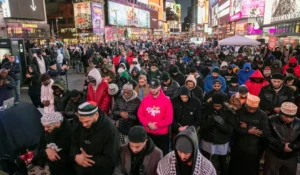U.S. Court Approves Ending Work Permits and TPS for 60,000 Immigrants

WASHINGTON, DC - JUNE 28: The U.S. Supreme Court is shown at dusk on June 28, 2023 in Washington, DC. The high court is expected to release more opinions tomorrow ahead of its summer recess, with cases involving affirmative action and student loan debt relief still to be decided. (Photo by Drew Angerer/Getty Images)
A federal appeals court in the United States on Wednesday cleared the way for the Trump administration to end work permits and Temporary Protected Status (TPS) for nearly 60,000 immigrants from Central America and Nepal. The three-judge panel issued the order without providing detailed legal reasoning.
TPS protections for Nepalis have already expired as of August 5, while protections for Hondurans and Nicaraguans will end on September 8. The administration can now legally terminate these immigrants’ work and residency privileges.
Tricia McLaughlin, a spokesperson for the U.S. Department of Homeland Security, stated, “This decision restores integrity to the immigration system and ensures that TPS is not used as a de facto asylum system.”
However, Ahilan Arulanantham, an attorney with the UCLA Center for Immigration Law and Policy, criticized the court, saying the ruling “effectively sanctions the government’s power grab” and opens the door for stricter measures against immigrant communities.
Previously, U.S. District Judge Trina L. Thompson had temporarily blocked the administration from canceling these protections in July, citing concerns that the move could be motivated by racial bias.
The Trump administration has already implemented sweeping restrictions on both illegal and legal immigration, including heightened scrutiny of refugees, students, and naturalization applicants.
The court’s ruling has sparked concern among immigrant communities in Central America and Nepal, with human rights organizations warning that the termination of TPS and work permits could put many families in vulnerable situations. Protests and advocacy campaigns are reportedly being organized in major cities, including New York.






